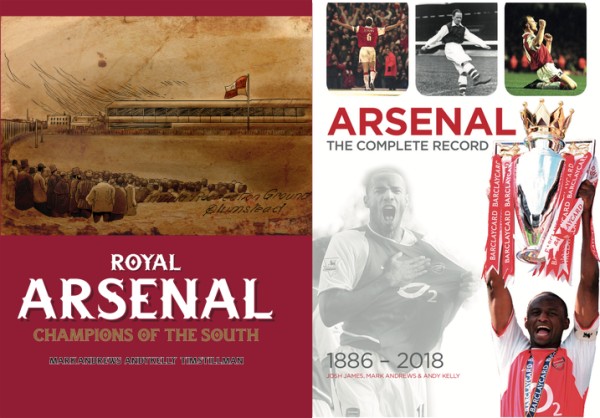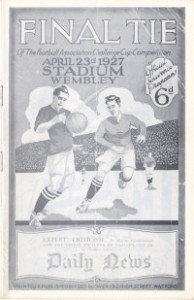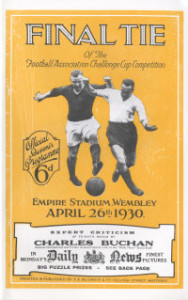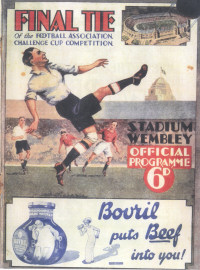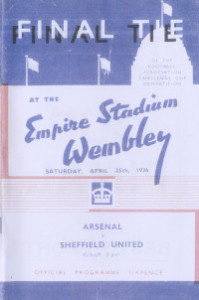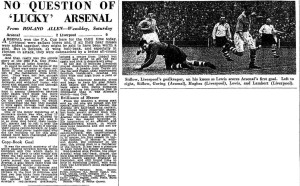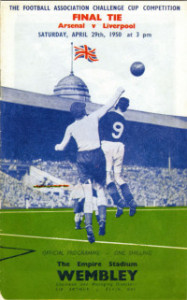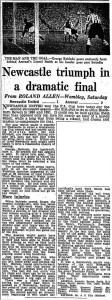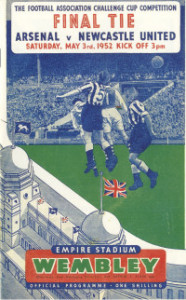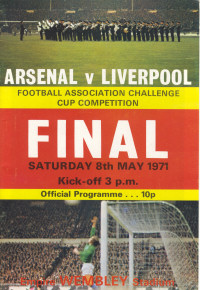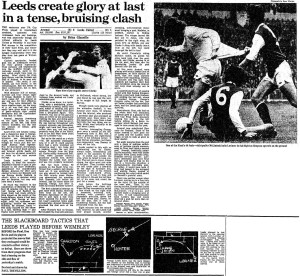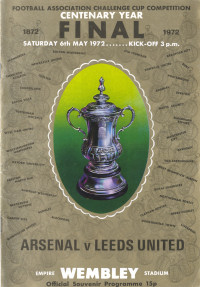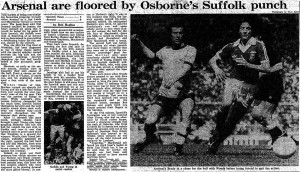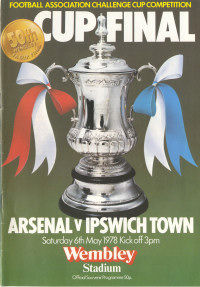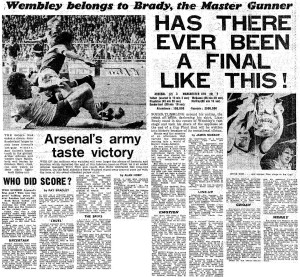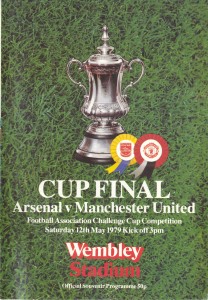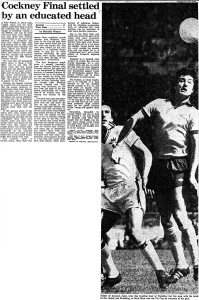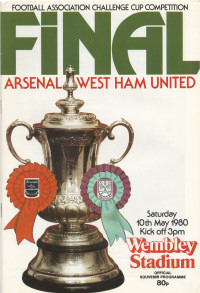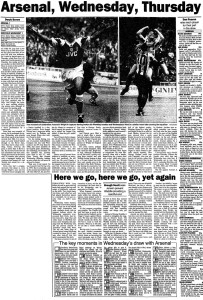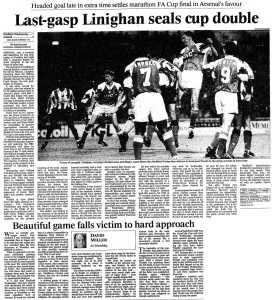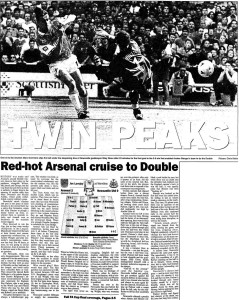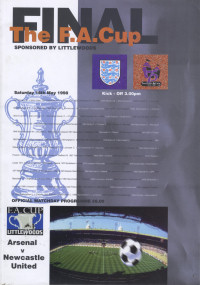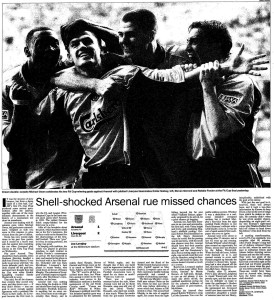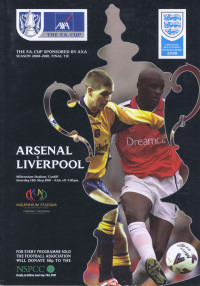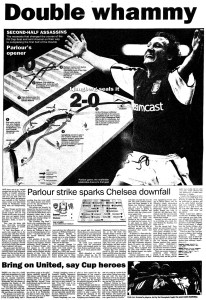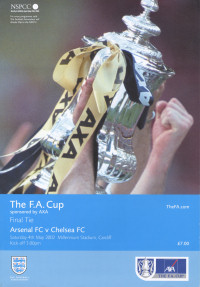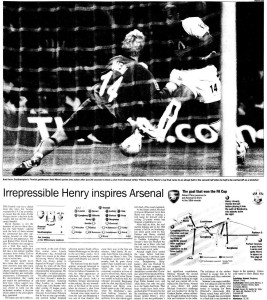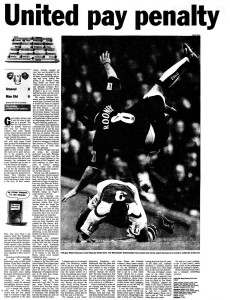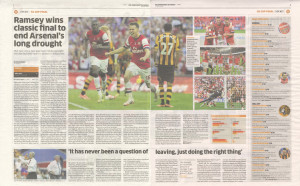Last year we thought it would be a good idea to put together a compendium of information relating to all of Arsenal’s FA Cup final appearances on one page so you don’t have to trawl all over the internet to find out the answers to all of those nagging questions.
We’ve updated the article and made some additions. We’ve added a brief match report for each game which we wrote for the Arsenal magazine last year, and most of the programmes for the games. We were hoping to have all of them ready in time for this blog but the later years take ages to scan as they are so big. We’ll add them as we scan them in. Be aware that these later programmes are huge, physically and electronically. With this in mind we’ve shown the file size for each one so you know what you are letting yourself in for. This article was originally posted in 2015 and has been updated to include all subsequent FA Cup final appearances.
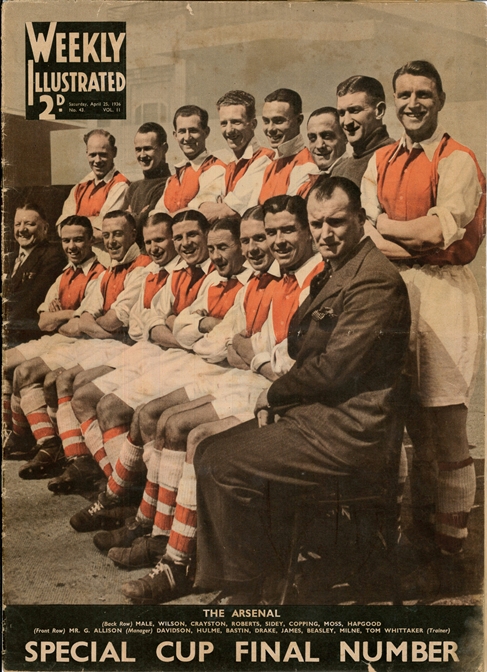
Weekly Illustrated 25 April 1936.
Arsenal have appeared in 18 previous FA Cup finals, winning 11 of them. Reaching the 2015 final means that Arsenal have surpassed the record the held jointly with Manchester United, and a win will give them a record 12th win. What we have collated here is a list of all the FA Cup finals that Arsenal have appeared in with match details, line-ups, match reports and some stats at the end of the article.
We don’t expect you to read through this all in one go, but to dip in whenever you think “who was Arsenal’s captain in the 2003 final” or “what was the weather like in the 1950 final?” We highly recommend reading the match reports, especially for the earlier finals even if it is only to see the difference in reporting styles when compared with today’s reporters.
The front cover of Weekly Illustrated from 25 April 1936 was kindly supplied by @OpArsenalArt #OpAa – who produce high quality Arsenal memorabilia and impressive iconography.
Final appearances (3 or more):
5 – Ray Parlour, Pat Rice, David Seaman
4 – Tony Adams, Dennis Bergkamp, Ashley Cole, Joe Hulme, Martin Keown, Freddie Ljungberg, David O’Leary, Patrick Vieira
3 – Cliff Bastin, Hector Bellerin, Liam Brady, Lee Dixon, Olivier Giroud, Eddie Hapgood, Thierry Henry, Pat Jennings, Bob John, Lauren, Per Mertesacker, Sammy Nelson, Mesut Ozil, Tom Parker, Robert Pires, David Price, Aaron Ramsey, Graham Rix, Frank Stapleton, Alan Sunderland, Sylvain Wiltord, Willie Young
N.B. The 1993 final counts as one appearance.
Winners appearances:
4 – Ray Parlour, David Seaman.
3 – Tony Adams, Hector Bellerin, Dennis Bergkamp, Ashley Cole, Olivier Giroud, Martin Keown, Lauren, Freddie Ljungberg, Per Mertesacker, Mesut Ozil, Aaron Ramsey, Patrick Vieira.
2 – Cliff Bastin, Santi Cazorla, Francis Coquelin, Lee Dixon, Edu, Eddie Hapgood, Thierry Henry, Rob Holding, Joe Hulme, Alex James, Laurent Koscielny, David O’Leary, Alex Oxlade-Chamberlain, Robert Pires, Pat Rice, Alexis Sanchez, Gilberto Silva, Sylvain Wiltord, Jack Wilshere, Nigel Winterburn., Granit Xhaka
1 – Nicolas Anelka, Pierre-Emerick Aubameyang, George Armstrong, Mikel Arteta, Alf Baker, Walley Barnes, Ray Bowden, Liam Brady, Kevin Campbell, Sol Campbell, Dani Ceballos, Denis Compton, Leslie Compton, Wilf Copping, Freddie Cox, Jack Crayston, Paul Davis, Ted Drake, Mohamed Elneny, Lukasz Fabianski, Cesc Fabregas, Alex Forbes, Charlie George, Kieran Gibbs, Peter Goring, George Graham, David Jack, Pat Jennings, John Jensen, Charlie Jones, Kanu, Eddie Kelly, Ray Kennedy, Saed Kolasinac, Alexandre Lacazette, Jack Lambert, Jens Lehmann, Reg Lewis, Andy Linighan, Jimmy Logie, David Luiz, Oleg Luzhny, Frank McLintock, Bob McNab, Ainsley Maitland-Niles, George Male, Emiliano Martinez, Joe Mercer, Paul Merson, Nacho Monreal, Sammy Nelson, Eddie Nketiah, David Ospina, Marc Overmars, Sokratis Papastathopoulos, Tom Parker, Nicolas Pepe, Emmanuel Petit, David Platt, Lukas Podolski, Charlie Preedy, David Price, John Radford, Jose Antonio Reyes, Graham Rix, Herbie Roberts, Tomas Rosicky, Bacary Sagna, Yaya Sanogo, Laurie Scott, Bill Seddon, Philippe Senderos, Peter Simpson, Alan Smith, Frank Stapleton, Peter Storey, Alan Sunderland, George Swindin, Wojciech Szczesny, Brian Talbot, Kieran Tierney, Kolo Toure, Robin van Persie, Theo Walcott, Steve Walford, Danny Welbeck, Alex Wilson, Bob Wilson, Christopher Wreh, Ian Wright, Willie Young.
The following players were non-playing substitutes in winning finals:
2 – Mathieu Flamini, Alex Manninger.
1 – Manuel Almunia, Steve Bould, Petr Cech, Sol Campbell, Lee Dixon, Gabriel, Kieran Gibbs, Gilles Grimandi, Alex Iwobi, Kanu, Lauren, Matt Macey, Nacho Monreal, Reiss Nelson, David Ospina, Lucas Perez, Bukayo Saka, Ian Selley, Matt Smith, Wojciech Szczesny, Stuart Taylor, Lucas Torreira, Kolo Toure, Giovanni van Bronckhorst, Thomas Vermaelen, Theo Walcott, Joe Willock, Ian Wright, Richard Wright.
Arsenal’s FA Cup final goalscorers:
2 – Pierre-Emrick Aubameyang, Reg Lewis, Freddie Ljungberg, Aaron Ramsey, Alexis Sanchez, Ian Wright.
1 – Nicolas Anelka, Santi Cazorla, Ted Drake, Charlie George, Alex James, Bob John, Eddie Kelly, Olivier Giroud, Laurent Koscielny, Jack Lambert, Andy Linighan, Per Mertesacker, Marc Overmars, Ray Parlour, Robert Pires, Frank Stapleton, Alan Sunderland, Brian Talbot, Theo Walcott.
Arsenal’s FA Cup final captains:
| Player | Appearances as captain | Winners’ medals as captain |
| Charlie Buchan | 1 | 0 |
| Tom Parker | 2 | 1 |
| Alex James | 1 | 1 |
| Joe Mercer | 2 | 1 |
| Frank McLintock | 2 | 1 |
| Pat Rice | 3 | 1 |
| Tony Adams | 4 | 3 |
| David Seaman | 1 | 1 |
| Patrick Vieira | 1 | 1 |
| Mikel Arteta | 1 | 1 |
| Per Mertesacker | 2 | 2 |
| Pierre-Emerick Aubameyang | 1 | 1 |
Arsenal FA Cup final managers:
| Manager | Finals | Wins |
| Herbert Chapman | 3 | 1 |
| George Allison | 1 | 1 |
| Tom Whittaker | 2 | 1 |
| Bertie Mee | 2 | 1 |
| Terry Neill | 3 | 1 |
| George Graham | 1 | 1 |
| Arsene Wenger | 8 | 7 |
| Mikel Arteta | 1 | 1 |
Kits
To read about the kits that Arsenal have worn in the FA Cup final, read She Wore A Yellow Ribbon.
Match details
1927 – The “Shiny Shirt” Final
23rd April 1927
Cardiff City 1 Arsenal 0
Wembley Stadium
Attendance: 91,206
Dan Lewis, Tom Parker, Andy Kennedy, Alf Baker, Jack Butler, Bob John, Joe Hulme, Charlie Buchan (captain), Jimmy Brain, Billy Blyth, Sid Hoar.
Arsenal went into their first FA Cup final as slight underdogs against the Bluebirds who had reached the final only two years earlier. Despite having Charlie Buchan to bolster the ranks The Gunners could not break down Cardiff, and Hughie Ferguson scored the winner. His effort slipped under Arsenal goalkeeper Dan Lewis’ body and the cup left England for the only time in its long history.
This was the first FA Cup final to be broadcast live on BBC radio, having future Arsenal manager and experienced journalist George Allison at the microphone
1930 – The “Graf Zeppelin” Final
26th April 1930
Arsenal 2 Huddersfield Town 0
Wembley Stadium
Attendance: 92,488
Charlie Preedy, Tom Parker (captain), Eddie Hapgood, Alf Baker, Bill Seddon, Bob John, Joe Hulme, David Jack, Jack Lambert, Alex James, Cliff Bastin.
Goalscorers: James (16), Lambert (88)
For their second final Arsenal were pitted against Herbert Chapman’s former team. Arsenal’s first goal had been planned on the team bus on the way to the game, Alex James taking a quick free-kick to Cliff Bastin who returned the ball to the unmarked linchpin to slot home. In the dying minutes a long through-ball found Jack Lambert who shrugged off the Huddersfield defenders to secure the game and Arsenal’s first major silverware.
Both teams were led onto the pitch side-by-side for the first time in honour of Herbert Chapman.
1932 – The “Over The Line” Final
23rd April 1932
Newcastle United 2 Arsenal 1
Wembley Stadium
Attendance: 92,298
Frank Moss, Tom Parker (captain), Eddie Hapgood, Charlie Jones, Herbie Roberts, George Male, Joe Hulme, David Jack, Jack Lambert, Cliff Bastin, Bob John.
Goalscorer: John (15).
Arsenal’s build up was thrown into turmoil as their playmaker was ruled out in a training exercise as Alex James failed to pass trainer Tom Whittaker’s test at their Brighton practice ground. Without James, Arsenal failed to match Newcastle despite going ahead from a Bob John goal. Two Jack Allen goals, one in each half, ensured Newcastle won the FA Cup for the third time.
Photographic evidence proved that the cross for the Magpies first goal was made from over the goal line. However at the time the referee allowed play to continue and the goal stood.
.
1936 – The “Viewed From The Skies” Final
25th April 1936
Arsenal 1 Sheffield United 0
Wembley Stadium
Attendance: 93,384
Alex Wilson, George Male, Eddie Hapgood, Jack Crayston, Herbie Roberts, Wilf Copping, Joe Hulme, Ray Bowden, Ted Drake, Alex James (captain), Cliff Bastin.
Goalscorer: Drake (74).
Arsenal’s team consisted of 10 internationals, with the only non-capped player being the goalkeeper, Alex Wilson. Consequently they were hot favourites, however Sheffield United rose to the occasion and on the day were marginally the better team. Nevertheless the Gunners quality eventually shone through and they scored the winner through the left foot of Ted Drake, who had recently returned to the team after a cartilage operation.
A dispute between Wembley and the newsreel companies resulted in the latter not being allowed inside the stadium to film the game. They got around this by filming from autogyros that were flown over the stadium.
1950 – The “Old Gold” Final
29th April 1950
Arsenal 2 Liverpool 0
Wembley Stadium
Attendance: 100,000
George Swindin, Laurie Scott, Walley Barnes, Alex Forbes, Leslie Compton, Joe Mercer (captain), Freddie Cox, Jimmy Logie, Peter Goring, Reg Lewis, Denis Compton.
Goalscorer: Lewis (18 and 63).
Resplendent in their old gold kit, specially made for the final, Arsenal dominated this final completely. Conditions were slippery following incessant rain beforehand, and Arsenal adapted the best. Reg Lewis’ first goal was a simple tap-in following a combination of passes masterminded by Logie. Lewis’ second goal was almost identical to his first and capped a great team effort.
This was the first FA Cup final shown live on television. It was watched by an invited audience of 1,000 on a 20ft x 15ft screen at the Odeon Cinema in Penge.
1952 – The “About Time They Had Substitutes” Final
3rd May 1952
Newcastle United 1 Arsenal 0
Wembley Stadium
Attendance: 100,000
George Swindin, Walley Barnes, Lionel Smith, Alex Forbes, Ray Daniel, Joe Mercer (captain), Freddie Cox, Jimmy Logie, Cliff Holton, Doug Lishman, Don Roper.
Walley Barnes left the pitch after half an hour with a knee injury meaning the Gunners played on with ten men for the rest of the match. The story of the match was the Herculean effort from Arsenal’s fit players who did well to guard the goal from Newcastle’s most feared forward Jackie Milburn. But cup-holders Newcastle won the closely contested game with a late headed winner from Chilean born striker Robledo.
Wartime Prime Minister Winston Churchill was in the royal box to present the FA Cup trophy.
1971 – The “Long Haired Lover Beats Liverpool” Final
8th May 1971
Arsenal 2 Liverpool 1
Wembley Stadium
Attendance: 100,000
Bob Wilson, Pat Rice, Bob McNab, Peter Storey (Eddie Kelly), Frank McLintock (captain), Peter Simpson, George Armstrong, George Graham, John Radford, Ray Kennedy, Charlie George.
Goalscorers: Kelly (101), George (111).
Fresh from the League title win at White Hart Lane, Arsenal dominated the play in a goalless normal time. However, just into extra-time Steve Heighway scored only for Eddie Kelly, on for Peter Storey, to hit the ball goal-bound for the equaliser. In the final session of extra-time Charlie George passed the ball to Radford and got it back for George to rifle in a 20 yard scorcher. The Double was won.
Eddie Kelly became the first substitute to score in an FA Cup final.
1972 – The “Centenary Year” Final
6th May 1972
Leeds United 1 Arsenal 0
Wembley Stadium
Attendance: 100,000
Geoff Barnett, Pat Rice, Bob McNab, Peter Storey, Frank McLintock (captain), Peter Simpson, George Armstrong, Alan Ball, Charlie George, John Radford (Ray Kennedy), George Graham.
Favourites Leeds outplayed Arsenal in the Centenary Cup final. Geoff Barnett continued to stand in for the injured Bob Wilson, but could do nothing to stop Leeds scoring, when a header from ‘Man of the Match’ Allan Clarke went in from a Mick Jones cross. Arsenal went looking for the equaliser but to no avail as their best chance was in the 70th minute when Charlie George hit the woodwork
Despite it being billed as the Centenary final it was actually the 91st final due to the intervention of the First and Second World Wars.
1978 – The “Injury List” Final
6th May 1978
Ipswich Town 1 Arsenal 0
Wembley Stadium
Attendance: 100,000
Pat Jennings, Pat Rice (captain), Sammy Nelson, David Price, David O’Leary, Willie Young, Liam Brady (Graham Rix), Alan Sunderland, Malcolm Macdonald, Frank Stapleton, Alan Hudson.
The final was a disappointment for the Gunners as an injury-hit Arsenal, despite being overwhelming favourites, did not play to their undoubted talents and were beaten by Bobby Robson’s Ipswich Town, in their only appearance in an FA Cup final. The winner was scored by Roger Osborne after Ipswich had dominated the game.
The Cup final was the only round in which Malcolm Macdonald did not score in this season’s competition.
1979 – The “Five Minute” Final
12th May 1979
Arsenal 3 Manchester United 2
Wembley Stadium
Attendance: 99,219
Pat Jennings, Pat Rice (captain), Sammy Nelson, Brian Talbot, David O’Leary, Willie Young, Liam Brady, Alan Sunderland, Frank Stapleton, David Price (Steve Walford), Graham Rix.
Goalscorers: Talbot (12), Stapleton (43), Sunderland (89).
Goals by Brian Talbot and Frank Stapleton before half time gave the Gunners a two goal lead into the half time break. Arsenal exerted a stranglehold on the match but after David Price was substituted near the end, Manchester United scored twice in quick succession. With extra-time looming Liam Brady and Graham Rix combined for Alan Sunderland to score. Cue the celebrations both on the pitch and the Wembley terraces.
This match is often referred to as the “Five Minute Final” owing to the exciting finale.
1980 – The “Absolutely Knackered” Final
10th May 1980
West Ham United 1 Arsenal 0
Wembley Stadium
Attendance: 100,000
Pat Jennings, Pat Rice (captain), John Devine (Sammy Nelson), Brian Talbot, David O’Leary, Willie Young, Liam Brady, Alan Sunderland, Frank Stapleton, David Price, Graham Rix.
Trevor Brooking and Alan Devonshire controlled the midfield, as Arsenal created few chances. Brooking scored with a low header and from then on West Ham never really looked in trouble. This final is remembered for Willie Young’s foul on Paul Allen minutes from time as he moved in on goal just outside the penalty area. Young received a yellow card and the administrators moved in to alter the professional foul rules.
West Ham had been drawn as the “home” team but chose to wear their change kit of all white. Arsenal had to wear their away kit due to a clash of colour between the shorts.
1993 – The “Last Gasp” Final
15th May 1993
Arsenal 1 Sheffield Wednesday 1
Wembley Stadium
Attendance: 79,347
David Seaman, Lee Dixon, Andy Linighan, Tony Adams (captain), Nigel Winterburn, Paul Merson, Paul Davis, John Jensen, Ray Parlour (Alan Smith), Kevin Campbell, Ian Wright (David O’Leary).
Goalscorer: Wright (20).
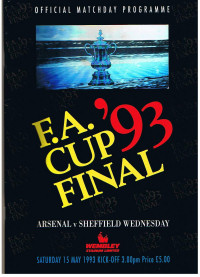
1993 programme
(Will be added soon)
It was unsurprising that these two teams produced a draw having played each other just nine days before and for the fourth time this season. This resulted in a dour game in which both teams cancelled each other out except for two typical examples of goal-poaching. An Ian Wright header from a set-piece put Arsenal ahead whilst David Hirst converted a Mark Bright header from close range.
Before the game, Steve Morrow collected his League Cup winner’s medal, having broken his arm at the end of that final following some high-jinks from Tony Adams.
20th May 1993
Arsenal 2 Sheffield Wednesday 1
Wembley Stadium
Attendance: 62,267
David Seaman, Lee Dixon, Andy Linighan, Tony Adams (captain), Nigel Winterburn, Paul Merson, Paul Davis, John Jensen, Kevin Campbell, Alan Smith, Ian Wright (David O’Leary).
Goalscorers: Wright (34), Linighan (119).
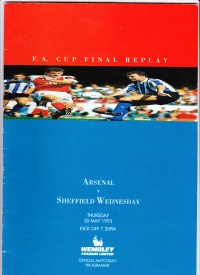
1993 replay programme
(Will be added soon)
Arsenal, in the last ever FA Cup final replay, became the first team to win the domestic cup double with a very late headed winner from Andy Linighan at rain swept Wembley. The Gunners had taken the lead in front of a low crowd of 62,267 after Ian Wright ran onto a Alan Smith flick and shot past Chris Woods, only for Wednesday to equalise with a deflected Chris Waddle shot past David Seaman.
David O’Leary won his second FA Cup winner’s medal fourteen years after his first, the longest gap for a player.
1998 – The “Easy” Cup Final
16th May 1998
Arsenal 2 Newcastle United 0
Wembley Stadium
Attendance: 79,183
David Seaman, Lee Dixon, Tony Adams (captain), Martin Keown, Nigel Winterburn, Ray Parlour, Patrick Vieira, Emmanuel Petit, Marc Overmars, Christopher Wreh (David Platt), Nicolas Anelka.
Goalscorers: Overmars (23), Anelka (69).
Arsenal were strong favourites to win the FA Cup even without the injured Dennis Bergkamp and Ian Wright. Marc Overmars settled any Arsenal nerves when he prodded an Emmanuel Petit through-ball between Shay Given’s legs. Alan Shearer hit the post in the second-half before Nicolas Anelka clinched Arsenal’s second Double when he shrugged off Steve Howey and produced a great finish from just inside the penalty area.
Tony Adams became the first Arsenal captain to lead his side to two FA Cup final wins.
2001 – The “Why Did He Make Those Substitutions” Final
12th May 2001
Liverpool 2 Arsenal 1
Millennium Stadium
Attendance: 72,500
David Seaman, Lee Dixon (Dennis Bergkamp), Martin Keown, Tony Adams (captain), Ashley Cole, Robert Pires, Gilles Grimandi, Patrick Vieira, Freddie Ljungberg (Nwankwo Kanu), Sylvain Wiltord (Ray Parlour), Thierry Henry.
Goalscorer: Ljungberg (72).
A relatively quiet first half ended goalless, but after quarter of an hour Arsenal were inexplicably denied a penalty when a Thierry Henry goal bound shot was handled on the line by Stephane Henchoz. The Gunners dominated exchanges in the second-half and went ahead from Freddie Ljungberg, only for Michael Owen to score a late brace to deny Arsenal in the Cardiff sunshine.
This was the first time the FA Cup final had been played outside of England, due to the Wembley redevelopment plan.
2002 – The “It’s Alright, It’s Only Ray Parlour” Final
4th May 2002
Arsenal 2 Chelsea 0
Millennium Stadium
Attendance: 73,963
David Seaman, Lauren, Sol Campbell, Tony Adams (captain), Ashley Cole, Sylvain Wiltord (Martin Keown), Ray Parlour, Patrick Vieira, Freddie Ljungberg, Dennis Bergkamp (Edu), Thierry Henry (Nwankwo Kanu).
Goalscorers: Parlour (70), Ljungberg (80).
Although both sides were graced with world-class forwards, they were matched by two goalkeepers of equal stature. The deadlock was finally broken when “it’s only Ray Parlour” scored with a curling shot inside Cudicini’s left post from 25 yards out. Ten minutes later man of the match Freddie Ljungberg scored with an almost identical goal, to which Chelsea had no answer. This win set Arsenal up for their third Double which was won four days later at Old Trafford.
Freddie Ljungberg became the first player in 40 years to score in successive FA Cup finals.
2003 – The “Indoors” Final
17th May 2003
Arsenal 1 Southampton 0
Millennium Stadium
Attendance: 73,726
David Seaman (captain), Lauren, Martin Keown, Oleg Luzhny, Ashley Cole, Robert Pires, Ray Parlour, Gilberto Silva, Freddie Ljungberg, Dennis Bergkamp (Sylvain Wiltord), Thierry Henry.
Goalscorer: Pires (38).
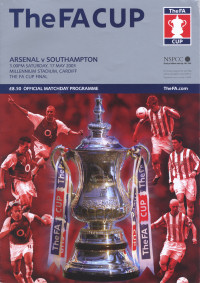
2003 programme
(Will be added soon)
Arsenal retained the FA Cup for the first time in the club’s history, in this all-Premiership clash, with a Robert Pires shot from short range. The Gunners were hot pre-match favourites and the gulf in class on the pitch was reflected in their almost total dominance, especially shown in the form of Dennis Bergkamp and man of the match Thierry Henry.
This was the first FA Cup Final to be played indoors as the Millennium Stadium retractable roof was closed due to the poor weather.
2005 – The “Park The Bus” Final
21st May 2005
Arsenal 0 Manchester United 0 (Arsenal won 5-4 on penalties)
Millennium Stadium
Attendance: 71,876
Jens Lehmann, Lauren, Kolo Toure, Philippe Senderos, Ashley Cole, Cesc Fabregas (Robin van Persie), Patrick Vieira (captain), Gilberto Silva, Robert Pires (Edu), Jose Antonio Reyes, Dennis Bergkamp (Freddie Ljungberg).
Penalty scorers: Lauren, Ljungberg, van Persie, Cole, Vieira.
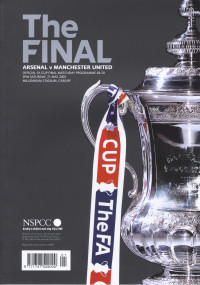
2005 programme
(Will be added soon)
Arsene Wenger changed from his usual attacking tactics to a holding game, looking to contain Manchester United’s forwards. The result was a game of few chances and no goals. As the game headed towards penalties, Arsenal were dealt a blow as Reyes was sent-off for a second bookable offence. Nine of the ten penalties were converted, the last being Patrick Vieira’s last kick for the club which sealed Arsenal’s tenth FA Cup win.
This was the first FA Cup final to be decided by a penalty shoot-out.
2014 – The “Comeback” Final
17th May 2014
Arsenal 3 Hull City 2
Wembley Stadium
Attendance: 89,345
Lukasz Fabianski, Bacary Sagna, Per Mertesacker, Laurent Koscielny, Kieran Gibbs, Mikel Arteta, Aaron Ramsey, Santi Cazorla (Tomas Rosicky), Mesut Ozil (Jack Wilshere), Lukas Podolski (Yaya Sanogo), Olivier Giroud.
Scorers: Cazorla (17), Koscielny (71), Ramsey (109).
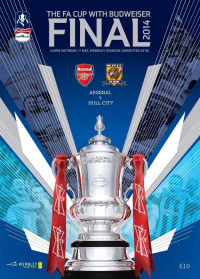
2014 programme
(Will be added soon)
Arsenal made the worst possible start, conceding two goals within the opening nine minutes. It could have been game over a few minutes later had Kieran Gibbs not headed Alex Bruce’s looping header off the line. Santi Cazorla’s free-kick brought Arsenal back into the game, and Laurent Koscielny levelled the scores midway through the second half. Aaron Ramsey fired home the winner from Olivier Giroud’s backheel to complete an amazing comeback. Hull could have grabbed an equaliser as Lukasz Fabianski went walkabouts but Aluko couldn’t find the net from an acute angle.
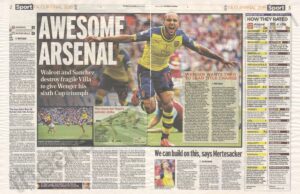 2015 – The “Easy Peezy Lemon Squeezy” Final
2015 – The “Easy Peezy Lemon Squeezy” Final
30th May 2015
Arsenal 4 Aston Villa 0
Wembley Stadium
Attendance: 89,283
Wojciech Szczesny, Hector Bellerin, Per Mertesacker, Laurent Koscielny, Nacho Monreal, Theo Walcott (Olivier Giroud), Francis Coquelin, Santi Cazorla, Aaron Ramsey, Alexis Sanchez (Alex Oxlade-Chamberlain), Mesut Ozil (Jack Wilshere).
Scorers: Walcott (50), Sanchez (60), Mertesacker (62), Giroud (90).
The Gunners resplendent in yellow and blue strolled to their biggest ever final win in what was frankly the most one sided final for many a year. However it wasn’t until Theo Walcott thumped in the opener 5 minutes before half time that the overwhelming superiority was even slightly reflected. An absolute stunner by Alexis Sanchez just after the break put the result beyond doubt. The rest of the game had the same lopsided feel as captain Per Mertesacker extended the lead with a header and Olivier Giroud scored right on the stroke of the final whistle.
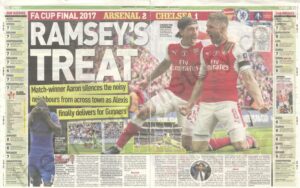 2017 – The “Unexpected Win” Final
2017 – The “Unexpected Win” Final
27th May 2017
Arsenal 2 Chelsea 1
Wembley Stadium
Attendance: 89,472
David Ospina, Rob Holding, Per Mertesacker (captain), Aaron Ramsey, Nacho Monreal, Alex Oxlade-Chamberlain (Francis Coquelin), Hector Bellerin, Granit Xhaka, Danny Welbeck (Olivier Giroud), Mesut Ozil, Alexis Sanchez (Mohamed Elneny).
Goalscorers: Sanchez (4), Ramsey (79)
A defence put together with elastoplast was the lynchpin of this unexpectedly deserved win. Per Meresacker in his only start of the season was magnificent and in only the fourth minute it became apparent that luck was on the Gunners side, when an Alexis Sanchez finish which involved a clear handball (though technically allowable due to the rules) was given. Against the run of play Diego Costa scored, only for Aaron Ramsey to immediately head home the winner from a pinpoint Olivier Groud cross. This was Arsene Wenger’s seventh final triumph, and the club’s 13th win – both records for the competition.
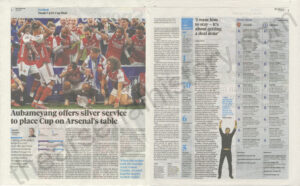 2020 – The “Empty Stadium” Final
2020 – The “Empty Stadium” Final
1st August 2020
Arsenal 2 Chelsea 1
Wembley Stadium
Attendance: 0
Emi Martinez, Hector Bellerin, KieranTierney (Sead Kolasinac), Granit Xhaka, David Luiz (Sokratis Papastathopoulos), Rob Holding, Ainsley Maitland-Niles, Dani Ceballos, Pierre-Emerick Aubameyang (captain), Alex Lacazette (Eddie Nketiah), Nicolas Pepe
Goalscorer: Aubameyang (28,67)
Against a backdrop of exceptional societal circumstances the Gunners extended their record FA Cup triumphs to 14 with no fans witnessing the Wembley win. The game began badly as, after five minutes, Chelsea strolled through the middle for Pulisic to score. However, Arsenal got a grip and took hold of the match soon afterwards. Near the half-hour mark, Pierre-Emerick Aubameyang was fouled, got up and took the penalty himself for the equaliser. Turning Kurt Zouma inside out, the captain delivered a world class finish to chip over Willy Caballero for the winner in the second half.
—————–
Don’t forget to subscribe to the blog (top right). You know it makes sense.
Or have a look at our other site: The Arsenal Collection for more Arsenal memorabilia.
Copies of our books Royal Arsenal – Champions of the South and Arsenal: The Complete Record 1886-2018 are still available from the publishers.
